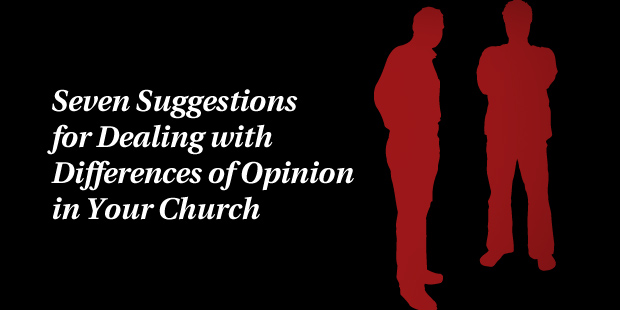At a recent conference the three of us on the panel (all pastors) were asked the question, “As a layperson, should I start a grassroots movement to change my church?” All three of us basically said, “No.” Following the conference I got a long and heated email from someone who was very upset with my answer. He thought I was guilty of clericalism and gave no place for the laity to know anything, do anything, or ever question the pastor. That was certainly not what I said, nor, so far as I can tell, what most people thought we were communicating. But his concerns got my blogging juices flowing. The initial question about forming a grassroots movement to change a local church is one I’ve gotten in one form or another several times in the past five years. So perhaps it would be helpful to spell out my answer in a little more detail.
The Situation
Here’s the kind of situation I’ve been presented with many times. It’s what I assumed was behind the question at this recent conference.
You are at a church that doesn’t share your theology or seems to be heading in the wrong theological direction. Naturally, you are concerned and want to do something about it. You are sad to see your church change for the worse or sad to see your church less than what it should be. You wonder what you can do to help get things on track.
This situation usually arises for one of two reasons. Either you have recently come to a better theological understanding yourself and now see deficiencies in your pastor and in your church which you didn’t see before, or your church recently brought in a new pastor who is setting things on a different theological trajectory. There are, of course, variations to these two scenarios. Maybe you were brought on staff at a theologically weak church. Maybe your pastor has been drifting in recent years. Maybe your church just allowed something you disagree with (or just disallowed something you agree with). There are several permutations to the problem, but the basic contours stay the same: either you’ve changed or the church has changed, and the result in both cases is that the two aren’t lining up like they used to.
So what should you do?
Seven Suggestions
1. Pray for a humble heart. Make sure you aren’t being censorious. Check for plank-in-eye syndrome. Be sure you are giving your pastor and your church the benefit of the doubt. Ask the Lord for an open heart and an open mind.
2. Take note of your position. How you think about laboring for change in your church, and how you think of whether to work for change at all, has everything to do with your position in the church. Have you been at the church for decades or did you join two months ago? Have you proved yourself as a faithful servant in the body? Are you one of the official leaders of the church? An informal leader? A staff member? One of the others elders or pastors? The more designated authority you have–either by virtue of office, by virtue of maturity, or by virtue of years of service–the more you should do to work for change. The less you have, the less you should try to do.
3. Try to discern the relative importance of your concerns. Are you upset about preferences or about something more serious? Are your concerns about the character of your pastor or his personality? Are your theological concerns weighty or trivial? And if they are weighty, are they up for discussion in your church? If you’ve come to the Reformed faith in the midst of a Wesleyan church you have no business trying to make that congregation in the image of the Westminster Confession. Likewise, people in confessional churches (e.g., Reformed, Presbyterian, Lutheran) should not be surprised when their pastors teach the faith expressly laid down in their historic tradition.
4. Don’t talk up your concerns. Beware of building up an ever expanding circle of discontents. You may have to talk to a few persons for counsel. You may even know many other likeminded persons in the congregation. But your goal must not be to create a church within a church.
5. Consider encouraging your pastor with positive reinforcement. Find what you can commend and commend it. If your pastor is in need of more theological precision and development you may be able to give him good books to read–not usually polemical books championing your agenda, but positive devotional and theological works that give him a taste for sound doctrine. Maybe you can nudge your pastor toward a good conference or even take him to one yourself. If he is young or simply drifting a bit, your pastor may be open to gentle strengthening and redirection.
6. Consider prayerfully the course of direct confrontation. The pastor is not beyond correction. He can make mistakes. He can fall into error. He can get off track. He can grow proud. If after prayerful reflection you conclude that your concerns are serious and the trajectory worsening, set up a time to talk to your pastor or elders directly. I’ve never begrudged anyone coming to me with thoughtful concerns in a kind, humble way. Sometimes I agree with them. Sometimes I disagree. But I’m glad when they come to me or one of the elders directly.
7. Consider when it is time to leave. If your new theological convictions are out of step with the entire history and identity of the church, it’s best not to strategize for underground change. If a new pastor has come in and is moving things in a very different direction–with the full knowledge and blessing of the elders and with enthusiasm from most of the congregation–it’s best not to start a grassroots movement for reformation. If you’ve tried direct communication and the pastor or leaders tell you, in effect, “Thank you, but we see things a different way,” it’s best not to fight them tooth and nail. If David did not lay a hand on Saul as the Lord’s anointed, we should be very cautious about launching a guerrilla movement to take down our duly-appointed pastors and elders.
In rare occasions where the theological differences amount to heresy (or are clearly out of bounds with your confessional documents), or when your personal concerns relate to scandalous behavior, you may pursue church discipline and file charges, but only if you are following the steps of Matthew 18. In most cases where members are concerned with the direction of the church, the issues are important but not so egregious as to merit a formal process of discipline. In these instances, after working through steps 1-6 (and doing so with patience, not in a fit of passion), the concerned church member can either peaceably submit or quietly leave.
Summing Up
Please hear what I am saying and not saying. I’m not saying you shouldn’t talk to your pastor or work for change. I’m not saying the local congregation is the personal fiefdom for the pastor. I’m not saying pastors can’t learn much from laypeople in the congregation. What I am saying is that practically you should not spend your life trying to do what has very little chance of success, theologically you should obey and respect your leaders, and spiritually you should not be divisive.
And lest this sound like I’m trying to protect my turf as a pastor, let me make clear that I am not addressing this question because it is a live issue in my congregation. I’m thinking of good folks in other churches who largely share my theology and have the very good desire to influence their local church for good. That’s what I took to be the context for the question at the conference. I want to commend these brothers and sisters for their discernment and encourage them in prizing theological depth and integrity. But we should also remember that seeking the things that make for “unity, purity, and peace” (as our membership vows put it), sometimes entails being peaceable enough to find unity with another body that has the purity you are looking for.
Read more from Kevin here.

Tags: Conflict, Kevin DeYoung, Staff Leadership Roles
|
What is MyVisionRoom? > | Back to Leadership >




















